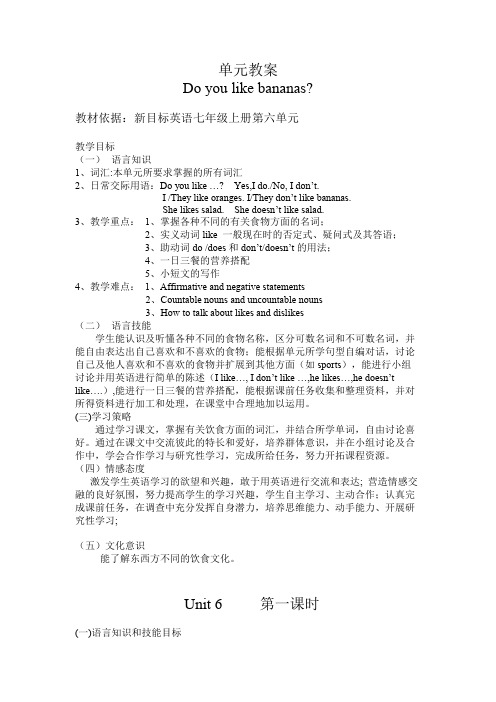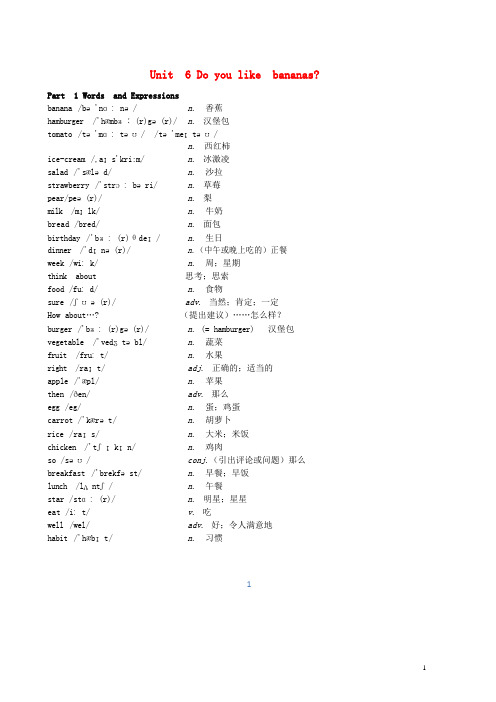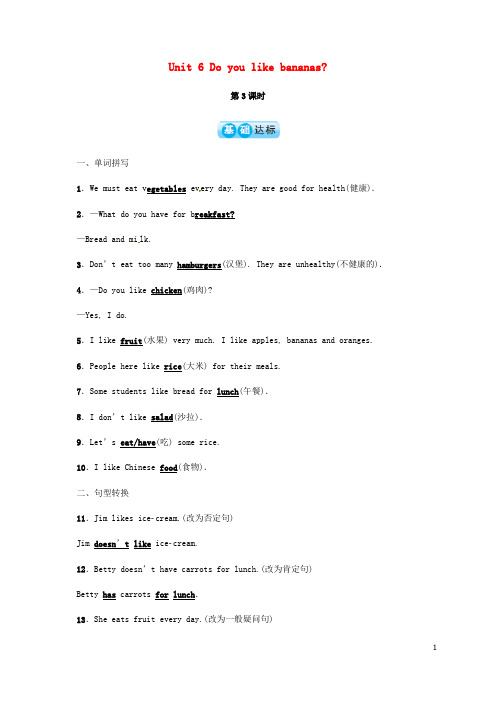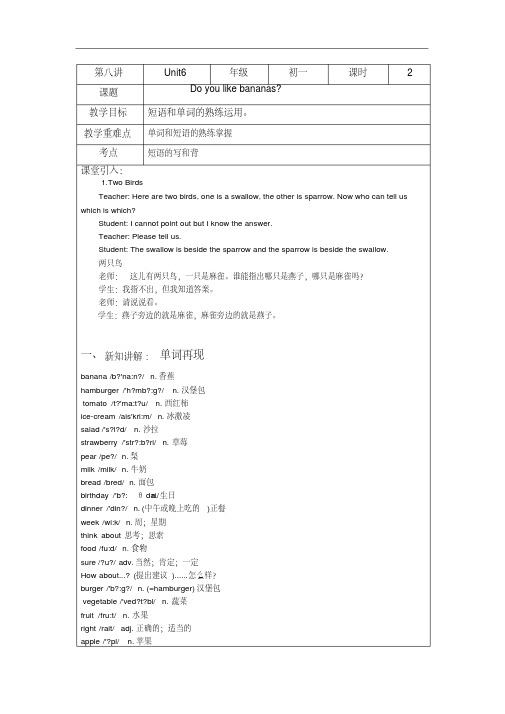2020七年级英语上册 Unit 6 Do you like bananas课文改写 (新版)人教新目标版
人教版七年级上册英语讲义 Unit 6 Do you like bananas

Unit 6 Do you like bananas? 讲义一、【重点单词】banana /bə'nɑ:nə/香蕉hamburger /'hæmbɜ:(r)ɡə(r)/汉堡包tomato /tə'mɑ:təʊ/西红柿ice-cream /,aɪs'kri:m/冰激凌salad /'sæləd/沙拉strawberry /'strɔ:berɪ/草莓pear /peə(r)/梨milk /mɪlk/牛奶bread /bred/面包birthday /'bɜ:(r)θdeɪ/生日dinner /'dɪnə(r)/(中午或晚上吃的)正餐week /wi:k/周;星期food /fu:d/食物sure /ʃʊə(r)/当然;肯定;一定burger /'bɜ:(r)ɡə(r)/汉堡包= hamburgervegetable /'veʤtəbəl/蔬菜fruit /fru:t/水果right /raɪt/正确的;适当的apple /'æpl/苹果then /ðen/那么egg /eɡ/蛋;鸡蛋carrot /'kærət/胡萝卜rice /raɪs/大米;米饭chicken /'ʧɪkɪn/ji鸡肉so /səʊ/ (引出评论或问题)那么breakfast /'brekfəst/早餐;早饭lunch /lʌnʧ/午餐star /stɑ:(r)/明星;星星eat /i:t/吃well /wel/好;令人满意的habit /'hæbɪt/习惯healthy /'helθi/健康的really /'ri:əli/真正地question /'kwesʧən/问题want /wɒnt/需要;想要be /bi:/变成fat /fæt/肥的;肥胖的二、【重点短语】1. John ’s birthday dinner 约翰的生日宴会2. vegetable salad 蔬菜沙拉3. two tomatoes 两个西红柿4. eat well 吃得营养5. think about 考虑6. eat/have breakfast/lunch/dinner 吃早/午/晚饭7. sports stars 体育明星8. the volleyball star 排球明星9. ask sb. about sth. 问某人某事10. like hamburgers/ice-cream 喜欢汉堡包/冰淇淋11. like eating eggs 喜欢吃鸡蛋12. her eating habits 她的饮食习惯13. be (not) healthy (不)健康14. one last question 最后一个问题15. healthy food 健康食物16. after breakfast/lunch/dinner 早/午/晚饭后17.one last question 最后一个问题18.some fruit 一些水果19.for dinner 作为晚餐20.how about 怎么样三、【重点句型】1.—Do you like salad? 你喜欢沙拉吗?一Yes,I do. /No, I don’t. 是的,我喜欢。
新目标七年级上册Unit6Do you like bananas?讲解与练习

新目标七年级上册Unit6Do you like bananas?讲解和练习讲解1、必背短语French fries炸薯条,ice cream冰淇淋,countable noun 可数名词,uncountable noun不可数名词,running star赛跑明星,healthy food健康食品,lots of=a lot of 大量;许多,a list of food食物清单,eat well吃得好2、词语辨析have和eathave 既可以指“吃”,也可以指“喝”。
I want to have some milk and some apple.我想喝些牛奶,吃些苹果。
eat 通常作“吃”。
I eat an apple every day.我每天吃一个苹果。
3、句型讲解1). —Do you like oranges? 你喜欢桔子吗?—Yes, I do. (P31) 是的,我喜欢。
like意为“喜欢”,“喜爱”。
like somebody or something 表示“喜欢某人或某事”。
如:I like him very much. 我非常喜欢他。
He doesn’t like salad. 他不喜欢沙拉。
2). —Let’s have French fries. 我们吃炸薯条吧。
—Oh, no. I don’t like. (P32) 哦,不,我不喜欢。
动词have意为“吃”,“喝”,是实义动词。
如:We have breakfast at seven. 我们七点钟吃早饭。
I don’t have coffee in the evening. 晚上我不喝咖啡。
注意:have 作此义解时,变成疑问句和否定句时必须用助动词do。
试译:你每天在家吃中饭吗?误:Have you lunch at home every day?正:Do you have lunch at home every day?3). Runner eats well! (P35) 赛跑选手吃得好!1)辨析:eat 或have:eat 与have 都可以表示“吃”的意思,有时两者可互换。
七年级英语上册人教版Unit6Do you like bananas?单元教案

单元教案Do you like bananas?教材依据:新目标英语七年级上册第六单元教学目标(一)语言知识1、词汇:本单元所要求掌握的所有词汇2、日常交际用语:Do you like …? Yes,I do./No, I don’t.I /They like oranges. I/They don’t like bananas.She likes salad. She doesn’t like salad.3、教学重点:1、掌握各种不同的有关食物方面的名词;2、实义动词like 一般现在时的否定式、疑问式及其答语;3、助动词do /does和don’t/doesn’t的用法;4、一日三餐的营养搭配5、小短文的写作4、教学难点:1、Affirmative and negative statements2、Countable nouns and uncountable nouns3、How to talk about likes and dislikes(二)语言技能学生能认识及听懂各种不同的食物名称,区分可数名词和不可数名词,并能自由表达出自己喜欢和不喜欢的食物;能根据单元所学句型自编对话,讨论自己及他人喜欢和不喜欢的食物并扩展到其他方面(如sports),能进行小组讨论并用英语进行简单的陈述(I like…, I don’t like …,he likes…,he doesn’t like….),能进行一日三餐的营养搭配,能根据课前任务收集和整理资料,并对所得资料进行加工和处理,在课堂中合理地加以运用。
(三)学习策略通过学习课文,掌握有关饮食方面的词汇,并结合所学单词,自由讨论喜好。
通过在课文中交流彼此的特长和爱好,培养群体意识,并在小组讨论及合作中,学会合作学习与研究性学习,完成所给任务,努力开拓课程资源。
(四)情感态度激发学生英语学习的欲望和兴趣,敢于用英语进行交流和表达; 营造情感交融的良好氛围,努力提高学生的学习兴趣,学生自主学习、主动合作;认真完成课前任务,在调查中充分发挥自身潜力,培养思维能力、动手能力、开展研究性学习;(五)文化意识能了解东西方不同的饮食文化。
人教版七年级上册英语例题与讲解:Unit6DoyoulikebananasSectionA

初中英语学习材料madeofjingetiejiUnit 6 Do you like bananas?突破词汇 Section A sure adv . 当然;肯定;一定→P95 Section B breakfast n . 早餐;早饭 →P102 How about...?(提出建议)……怎么样?→P96 healthy adj . 健康的 →P103 Section B eat v . 吃→P101 want v .需要;想要 →P103 well adv . 好;令人满意地→P102 fat adj . 肥的;肥胖的 →P104 把握句型 1.Do you like oranges?你喜欢橙子吗?2.Sure.How about burgers ,vegetable salad ,and some fruit?好吧。
咱们吃汉堡、蔬菜沙拉和水果怎么样?3.I don't want to be fat.我可不想变胖。
熟悉 语法 1.实义动词的一般现在时。
2.名词。
学会 交际 学会在日常生活中谈论好恶。
写作 练笔 学写某人喜爱或厌恶某物的短文。
Section A2dJack :Hey ,John's birthday dinner is next week.[1]Let's think about the food. Tom :[2]Sure.How about burgers ,vegetable salad ,and some fruit? Bill :Sounds good.John likes hamburgers.Jack :Oh ,I don't like salad.Bill :But John likes salad ,and it's his birthday.Jack :Yes ,you're right.What about the fruit?Tom :I think John likes strawberries and apples.Bill :OK.[3]Let's have strawberries and apples then.2d杰克:嗨,约翰的生日聚餐就在下周。
人教版2020年七年级英语上册Unit6Doyoulikebananas讲义(新版)人教新目标版

Unit 6 Do you like bananas?Part 1 Words and Expressionsbanana /bə'nɑːnə/ n. 香蕉hamburger /'hæmbɜː(r)gə(r)/ n. 汉堡包tomato /tə'mɑːtəʊ/ /tə'meɪtəʊ/n. 西红柿ice-cream /,aɪs'kri:m/ n. 冰激凌salad /'sæləd/ n. 沙拉strawberry /'strɔːbəri/ n. 草莓pear/peə(r)/ n. 梨milk /mɪlk/ n. 牛奶bread /bred/ n. 面包birthday /'bɜː(r)θdeɪ/ n. 生日dinner /'dɪnə(r)/ n.(中午或晚上吃的)正餐week /wiːk/ n. 周;星期think about 思考;思索food /fuːd/ n. 食物sure /ʃʊə(r)/ adv. 当然;肯定;一定How about…?(提出建议)……怎么样?burger /'bɜː(r)gə(r)/ n. (= hamburger) 汉堡包vegetable /'vedʒtəbl/ n. 蔬菜fruit /fruːt/ n. 水果right /raɪt/ adj. 正确的;适当的apple /'æpl/n. 苹果then /ðen/adv. 那么egg /eg/ n. 蛋;鸡蛋carrot /'kærət/ n. 胡萝卜rice /raɪs/ n. 大米;米饭chicken /'tʃɪkɪn/ n. 鸡肉so /səʊ/ conj.(引出评论或问题)那么breakfast /'brekfəst/ n. 早餐;早饭lunch /lʌntʃ/ n. 午餐star /stɑː(r)/ n. 明星;星星eat /iːt/ v. 吃well /wel/ adv. 好;令人满意地habit /'hæbɪt/ n. 习惯1healthy /'helθi/adj. 健康的really /'riːəli/ adv. 真正地question /'kwestʃən/ n. 问题want /wɒnt/ v. 需要;想要be /biː/ v. 变成fat /fæt/adj. 肥的;肥胖的Part 2:Texts课文(一)Jack: Hey, John’s birthday dinner is next week. Let’s think about the food.Tom: Sure. How about burgers, vegetable salad, and some fruit? Bill: Sounds good. John likes hamburgers.Jack: Oh, I don’t like salad.Bill: But John likes salad, and it’s his birthday.Jack: Yes, you’re right. What about the fruit?Tom: I think John likes strawberries and apples.Jack: OK. Let’s have strawberries and applesthen.Structure——谈论好恶1.Do you like salad? Yes, I do./No, I don’t.2.Do they like pears? Yes, they do./ No, they don’t.3.Does she like tomatoes? Yes, she does./ No, she doesn’t.4.I like oranges. I don’t like bananas.5.We like rice. We don’t like hamburgers.6.He likes ice-cream. He doesn’t like vegetables.重点句型:—Do / Does sb. like…?—Yes, sb. do / does.—No, sb. don’t / doesn’t.sb. like/likes ….sb. don’t/doesn’t like ….Underline the correct words in the brackets.在括号内正确的单词下画线。
初一英语上册Unit_6_Do_you_like_bananas

carrot
tomatoes
onion
broccoli
strawberries grapes
potatoes
1c
Listen and circle the food you hear in 1a.
1. orange 2. salad 3. eggs 4. apple
5. ice-cream 6. hamburger 7. banana
Countable nouns Uncount- Countable and
able nouns uncountable nouns
oranges carrots milk bananas tomatoes bread hamburgers eggs rice
vegetables apples
food fruit ice-cream salad chicken
5 以 o结尾的名词特殊记忆 Negroes and heroes like tomatoes and potatoes.
6 不规则变化 man - men ,foot - feet , woman - women child - childen
7 不可数名词如:broccoli
8既可数又不可数名词如:ice cream,salad
2.教学难点:如何引导学生询问或陈述对食物的喜 好。
五、教学策略
围绕以学生为中心的总策略综合运用任务型 教学法、情景交际教学法,合作探究、信息沟通 等方法使教学符合语言规律,努力达到课标的要 求。
六、教学媒体
本课采用现代化教学手段多媒体课件, 激发学生学习英语的兴趣。
Apple round, apple red. Apple juicy, apple sweet. Apple, apple, I love you. Apple sweet, I love to eat.
人教版英语七年级上册 Unit 6 Do you like bananas

This is a fruit and vegetable house (果疏屋). What’s in the house? (果蔬屋里有什么?)
some vegetables
some fruits
banana bananas
pear pears
strawberry strawberries
2 A: Do you like salad? B: No, I don’t.
1 A: Do you like bananas? B: Yes, I do.
3 A: Do you like oranges? B: Yes, I do.
Post-listening
1c Practice the conversations with your partner. Then make your own conversations.
2. tomatoes __i _ 3. oranges _f__ 4. ice-cream _h__ 5. salad __b_ 6. bananas _g__
7. strawberries __c_ 8. pears __j_
9. milk __e_ 10. bread _a__
Read the dialogue in the picture.
Read the conversation after the tape.
1. Girl: I like hamburgers. Do you like hamburgers? Boy: Yes, I do.
2. Girl: Do you like tomatoes? Boy: No, I don't like tomatoes.
—Do you like bananas? —Yes, I do. —Do you like salad? —No, I don’t. —Do you like oranges? —Yes, I do.
七年级英语Unit 6 Do you like bananas知识精讲

七年级英语Unit 6 Do you like bananas?【本讲主要内容】Unit 6 Do you like bananas?通过本课的学习我们应该能做下面的事:1. Learn to talk about likes and dislikes. 学习谈论好恶。
2. Learn the names of foods.学习一些食品的名称。
3. Talk about meals. 谈论三餐。
【知识掌握】【文化背景】1. 美国人的饮食习惯通常美国式饮食不讲究精细,追求快捷方便,也不奢华,比较大众化。
一日三餐都比较随便。
早餐以面包、牛奶、鸡蛋、果汁、麦片、咖啡、香肠等为主。
午餐一般在工作地点用快餐(快餐是典型的美国饮食文化,十分普及),一般有三明治、水果、咖啡、汉堡包、热狗等。
晚餐是正餐,比较丰盛,有一二道菜,如牛排、猪排、烤肉、炸鸡等,配面包、黄油、青菜、水果、点心等。
也有不少人上餐馆用晚餐。
美国餐馆很多,一般供应自助餐、快餐、特餐(固定份饭)、全餐等各种形式的餐饮,价格一般比较低廉,也可点菜,点菜价格最高。
早餐一般在8时左右,午餐一般在12时-14时,晚餐一般在18时左右。
他们在临睡前有吃点心的习惯,成人以水果、糖果为主,孩子则食用牛奶和小甜饼。
2. 做客进餐在有些文化中,作为客人去接受首次提供的食物是不礼貌的。
介于这个原因,到美国来访的客人有时会在主人首次邀请进食时说“不”。
他们期待主人再次邀请。
然而,在美国,主人会认为客人真不想吃了。
因此,当你在美国人家做客时,一定记住要如实地说出想要或不想要。
当然当你被邀到某人家去共进餐时,你不喜欢所提供的一些食品时,你可以不去吃它。
然而,你不要让人觉得你很讨厌那些食物。
如果可能的话,对每样食品都多少吃一点儿。
当然,挑你喜欢的吃两样,把其他的留在盘中也可以。
【词汇用法】1. lots of = (a lot of)许多;大量;很多既可以修饰可数名词,又可以修饰不可数名词。
七年级英语上册Unit_6_Do_you_like_bananas

boxes
buses
families
watches
Exercises:
1. He likes ___________ strawberries (strawberry). 2. - What are these? - They’re ______ carrots (carrot). hamburgers (hamburger). 3. Do you like ____________ 4. My sister ______ doesn’t _____ like (not like) football. 5. His father _____ has (have) oranges every day. 6. Do you like _______ (rice)? rice tomatoes (tomato)? 7. Does Mary like __________ 8. Bob likes _____________ (vegetable). vegetables 9. Let’s think about the ______ food (food). 10. My brother doesn’t like ________ chicken (chicken).
Countable nouns
a tomato
five tomatoes
a strawberry
four strawberries
a hamburger
hamburgers
an orange three oranges
可数名词和不可数名词 不可数名词
( 1) 定义:是指不能计数的名词。
Unit6Doyoulikebananas重点句子背诵人教版英语七年级上册

人教版英语七年级上册第五单元Unit 6 Do you like bananas?重点句子背诵同学们,英语的学习中,重点句子的积累至关重要,一方面,它们是语法知识的体现,另一方面,它们又是书面表达的基础,因此这些句子的积累和运用就显得至关主要。
接下来,我们就来总结一下七年级上册第六单元的重点句子。
1、Do you like bananas? 你喜欢香蕉吗?这是由助动词do帮助动词like引导的一般疑问句,由陈述句I like bananas得来。
回答:Yes ,I do. \ No , I don’t.2、Does she like tomatoes? 她喜欢西红柿吗?这是由助动词does帮助动词like引导的一般疑问句,由陈述句She likes tomatoes得来。
回答:Yes , she does. \ No , she doesn’t.同样,Does Tom like icecream?(汤姆喜欢冰激凌吗?)是由助动词does帮助动词like引导的一般疑问句,由陈述句Tom likes icecream.(汤姆喜欢冰激凌。
)得来。
回答:Yes , he does. \ No , he doesn’t.3、Do they like pears? 他们喜欢梨吗?这是由助动词do帮助动词like引导的一般疑问句,由陈述句They like pears得来。
回答:Yes , they do . \ No , they don’t.4、I like bananas. 我喜欢香蕉。
5、She likes hamburgers. 她喜欢汉堡包。
6、He likes icecream. 他喜欢冰激凌。
7、They like tomatoes and carrots. 他们喜欢西红柿和胡萝卜。
从第4句到第7句,要关注的点如下:第一,关注主谓一致:当主语是第三人称单数的时候,谓语动词用相应的第三人称单数形式,例如:She likes \ he likes\ Alice likes \ Tom likes等等;当主语不是第三人称单数的时候,谓语动词用原形,例如:I like \ They like \ We like \ Tom and Grace like等等。
2020七年级英语上册 Unit 6 Do you like bananas(单词+重点句型)语法解析

Unit 6 Do you like bananas?banana 香蕉hamburger 汉堡包tomato 西红柿ice-cream 冰激凌salad 沙拉strawberry 草莓pear 梨milk 牛奶bread 面包birthday 生日dinner (中午或晚上吃的)正餐week 周;星期think about 思考;思索food 食物不可数sure 当然;肯定;一定How about (提出建议)......怎么样?burger 汉堡包vegetable 蔬菜fruit 水果right 正确的;适当的apple 苹果then 那么egg 蛋;鸡蛋carrot 胡萝卜rice 大米;米饭chicken 鸡肉so (引出评论或问题)那么breakfast 早餐;早饭lunch 午餐star 明星;星星eat 吃well 好;令人满意地habit 习惯healthy 健康的really 真正地question 问题want 需要;想要be 变成fat 肥的;肥胖的1.breakfast n.早餐;早饭(表示一日三餐前的词一般不用冠词)【解析】①吃三餐习惯与动词have 连用,且为零冠词,但与形容词连用时,前面要加不定冠词a/an。
have breakfast 吃早饭have a good breakfast 吃一顿丰盛的早餐have a quick breakfast 早餐吃得很快②at breakfast 吃早餐时【扩展】brunch n.早午餐2. well adv.好;令人满意地【解析】常见搭配:do well in…在……做得好辨析good,fine,well,fine.① good 意为“好的,令人满意的”,常指物品的质量,人的品质等方面的好,也常与morning,evening,afternoon等词搭配表示问候。
Alice is a good girl. 爱丽丝是一个好女孩。
七年级英语上册-Unit-6-Do-you-like-bananas学生自主学习教材解读与能力培养试题-人教新目标版

Unit 6 Do you like bananas学生自主学习教材解读与能力培养试题一.学习重点【句型】1、Do you like…?Yes, I do. No, I don’t.你喜欢……?是的,我喜欢。
不,我不喜欢。
2、Do they like…?Yes,they do. No, they don’t.他们喜欢…?是的,他们喜欢.不,他们不喜欢。
3.Does he / she like…?Yes, he / she does. No, he / she doesn’t. 他/她喜欢…?是的,他/她喜欢。
不,他/她不喜欢。
【口语】1、Do you like hamburgers?你喜欢汉堡包吗?Yes, I do. No, I don’t.是的,我喜欢。
/ 不,我不喜欢。
2、I like French fries.我喜欢在薯条。
3、I don’t like tomatoes.我不喜欢西红柿。
【语法】可数名词与不可数名词二.难点讲评1.Do you like bananas?你喜欢香蕉吗?释:这是关于行为动词like一般现在时的一般问句及其回答。
在改为疑问句和否定句时,主语是第三人称单数,要借助于助动词does;主语不是第三人称单数,要借助于助动词do。
例如:I don’t like English very much. Do you like English?She doesn’t like English very much. Does she like English?2.like1)行为动词,意为“喜欢”,其反义词是dislike.2)介词,意为“象……一样”,其反义词是Unlike.例如:He looks like his father.他与他父亲长得一样。
3.—Yes,I do.是的,我喜欢。
d o有两种词性:1)行为动词,意为“做”,如:Let’s do our homework.咱们做作业吧。
初一英语上册Unit6Do_you_like_bananas

5.They (likes/like) pears, but they (don't/doesn't) like strawberries.
3b Number these sentences [1-4] to make a conversation.
lunch
every
dsaoy.mAned chehdoiecskn’et n
我们朋友每天中餐都吃米饭
like chicken or fish. 和肉.他不喜欢吃鸡和鱼。
some rice
11
/s/
③
U6
a glass of milk
drinks a box of milk
three tins of coke
口3 So, let's get salad. 口2 Yes, I do. 口1 Do you like salad? 口4 OK.
3c Food Survey
Ask your classmates about the food in the chart. Find out what they like and don’t like.
4. —Let’s eat ice cream. —That ___s_o_u_n_d__s ___(听起来)good.
根据汉语提示写出正确单词。 1. We have __v_e_g_et_a_b_l_e_s_(蔬菜)for dinner
every day. 2. We have __m__a_n_y__ (许多)clubs. Join us
人教版2020七年级英语上册 Unit 6 Do you like bananas(第3课时)练习 (新版)人教新目标版

Unit 6 Do you like bananas?第3课时一、单词拼写1.We must eat v egetables ev ery day. They are good for health(健康).2.—What do you have for b reakfast?—Bread and mi lk.3.Don’t eat too many hamburgers(汉堡). They are unhealthy(不健康的).4.—Do you like chicken(鸡肉)?—Yes, I do.5.I like fruit(水果) very much. I like apples, bananas and oranges. 6.People here like rice(大米) for their meals.7.Some students like bread for lunch(午餐).8.I don’t like salad(沙拉).9.Let’s eat/have(吃) some rice.10.I like Chinese food(食物).二、句型转换11.Jim likes icecream.(改为否定句)Jim doesn’t like icecream.12.Betty doesn’t have carrots for lunch.(改为肯定句)Betty has carrots for lunch.13.She eats fruit every day.(改为一般疑问句)Does she eat fruit every day? 14.My sister likes eggs_and_apples for breakfast.(对画线部分提问) What does your sister like for breakfast?15.Does your father like c hicken for lunch ?(作否定回答)No,_he doesn ’t .三、用方框中所给词的适当形式填空eat , not have , like , they , apple16.He likes salad very much.17.Do you like apples,_Kate?18.Let’s eat some fruit, OK?19.His son doesn ’t_have an English dictionary.20.I love soccer and basketball and I play them every day.四、补全对话(有一项多余)Tom :Hello, Jack. What do you like for br eakfast?Jack :21.__D __ I think they ’re healthy.Tom :OK. 22.__E __ Do you like oranges?Jack :Well, I don ’t like oranges. 23.__F __Tom :What about lunch? Do you like salad?Jack :Yes, I do. 24.__B __Tom :Hmm...And do you like hamburgers for dinner?Jack :Oh, no, they ’re not healthy. 25.__A __五、语法填空My name is Bill. I have two good 26.friends(friend). They are Bob and Sandra. We eat different food every day.I like lots of food. For 27.breakfast(breakfast), I eat eggs and some fruit.I like oranges and bananas. For lunch, I have hamburgers and some salad. 28.For dinner, I have chicken and some vegetables.I like carrots and broccoli.Bob eats lots of 29.healthy(health) food every day. He 30.has(have) milk, two eggs and 31.an apple for breakfast. He has chicken and salad for lunch. And he 32.likes(like) broccoli and fish for dinner.Sandra is different from (we). She doesn’t eat fruit or vegetabl es. She only 34.ea ts(eat) unhealthy food.She likes French fries(薯条) and ice-cream.For breakfast, she eats hamburgers. 35.And for dinner, she eats French fries. After dinner, she eats ice-cream for dessert.六、任务型阅读根据短文内容,完成下列任务。
2019-2020学年初中英语人教新目标版七年级上册教案:Unit6Doyoulikebananas(含答案)

第八讲Unit6 年级初一课时 2 课题 Do you like bananas?教学目标短语和单词的熟练运用。
教学重难点单词和短语的熟练掌握考点短语的写和背课堂引入:1.Two BirdsTeacher: Here are two birds, one is a swallow, the other is sparrow. Now who can tell us which is which?Student: I cannot point out but I know the answer.Teacher: Please tell us.Student: The swallow is beside the sparrow and the sparrow is beside the swallow.两只鸟老师:这儿有两只鸟,一只是麻雀。
谁能指出哪只是燕子,哪只是麻雀吗?学生:我指不出,但我知道答案。
老师:请说说看。
学生:燕子旁边的就是麻雀,麻雀旁边的就是燕子。
一、新知讲解:单词再现banana/b?'na:n?/n.香蕉hamburger/'h?mb?:g?/n.汉堡包tomato/t?'ma:t?u/n.西红柿ice-cream/ais'kri:m/n.冰激凌salad/'s?l?d/n.沙拉strawberry/'str?:b?ri/n.草莓pear/pe?/n.梨milk/milk/n.牛奶bread/bred/n.面包birthday/'b?:θdai/n.生日dinner/'din?/n.(中午或晚上吃的)正餐week/wi:k/n.周;星期think about思考;思索food/fu:d/n.食物sure/?u?/adv.当然;肯定;一定How about...?(提出建议)......怎么样?burger/'b?:g?/n.(=hamburger)汉堡包vegetable/'ved?t?bl/n.蔬菜fruit/fru:t/n.水果right/rait/adj.正确的;适当的apple/'?pl/n.苹果then/een/adv.那么egg/eg/n.蛋;鸡蛋carrot/'k?r?t/n.胡萝卜rice/rais/n.大米;米饭chicken/'t?ikin/n.鸡肉so/s?u/conj.(引出评论或问题)那么breakfast/'brekf?st/n.早餐;早饭lunch/l?nt?/n.午餐star/sta:/n.明星;星星eat/i:t/v.吃well/wel/adv.好;令人满意地habit/'h?bit/n.习惯healthy/'helθi/adj.健康的really/'ri:?li/adv.真正地question/'kwest??n/n.问题want/w?nt/v.需要;想要be/bi:/v.变成fat/f?t/adj.肥的;肥胖的必背短语French fries炸薯条,ice cream冰淇淋,countable noun可数名词,uncountable noun不可数名词,eating habit 饮食习惯healthy food健康食品,lots of=a lot of大量;许多,a list of food食物清单,eat well吃得好think about 考虑知识点讲解1.eat 与have释:这两个词均跟“吃”有关,但用法不同。
2020七年级英语上册 Unit 6 Do you like bananas单元语法聚焦六 (新版)人教新目标版

Unit 6 Do you like bananas][行为动词的一般现在时结构和可数名词与不可数名词1.John likes hamburgers.约翰喜欢汉堡包。
2.I don't like salad.我不喜欢沙拉。
3.We like rice.我们喜欢米饭。
4.He likes icecream.他喜欢冰激凌。
5.He doesn't like vegetables.他不喜欢蔬菜。
6.—Do they like pears?他们喜欢梨吗?—No, they don't.不,他们不喜欢。
1.行为动词的一般现在时结构(以like为例)动词第三人称单数形式的规则变化:注意: have的第三人称单数形式是________,为不规则变化。
2.可数名词与不可数名词(1)名词分为可数名词与不可数名词。
可数名词指能用数字计数的名词。
不可数名词指不能直接用数字计数的名词,其数量可借助量词来表示,如a cup of coffee, a piece of bread。
可数名词复数的变化形式分为规则变化和不规则变化。
(2)名词复数的不规则变化需要同学们多积累。
如:man→men, woman→women, child→children, sheep→sheep, deer→deer, mouse→mice, tooth→teeth, foot→feet等。
(3)既可作可数名词又可作不可数名词的名词如:food (一般食物,不可数)→foods (食物种类,可数)fruit (一般水果,不可数)→fruits (水果种类,可数)chicken (鸡肉,不可数)→chickens (鸡,可数)orange (橙色;橙汁,不可数)→oranges (橙子,可数)(4)可数名词与不可数名词的用法①单数可数名词前常用冠词a, an或指示代词this, that来修饰。
②若表示一类事物时,可用a或an加上单数可数名词表示,也可用复数名词表示。
人教版七年级上册英语第六单元_Do_you_like_bananas

— Do you like _t_o_m_a_t_o_e_s__?
— No, I don’t like _t_o_m_a_t_o_e_s___.
— Let’s have _i_ce_-_c_r_e_a_m_.
— Oh, no. — No? — I don’t like
_i_c_e_-c_r_e_a_m__.
可数名词
(1)定义:是可以计数的名词。 (2)可数名词前可以用 a, an 限定, 表一
个….。 (3)可数名词前可以用 one, two, three …
限定。 (4)可数名词有复数形式。
uncountable nouns
milk
tea
meat
water
bread
rice
不可数名词
(1)定义:是指不能计数的名词。 (2)不可数名词前不可以用 a, an 限定。 (3)不可数名词前不可以用 one, two,
(2) 吃,喝;如: Let’s have some milk and some bread. 让我们喝些牛奶,吃些面包。
(3) 构成固定短语: have a look 看一看
Let’s have tomatoes?
What about an ice-cream?
Oh, no. I don’t like tomatoes.
Bill: But John likes salad, and it’s his birthday.
Jack: Yes, you’re right. What about the fruit?
Tom: I think John likes strawberries and apples.
